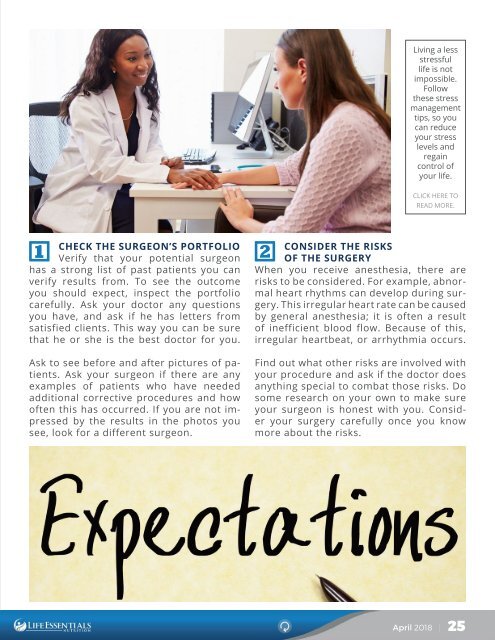Life Essentials Magazine April 2018
In the April 2018 issue of Life Essentials Magazine, learn about overcoming depression, relieving allergies, reducing hair loss, and more. We hope March was as fruitful for you as it was for our team. Spring is here, one of the best times of the year to take a breath of fresh air and get after your goals!
In the April 2018 issue of Life Essentials Magazine, learn about overcoming depression, relieving allergies, reducing hair loss, and more. We hope March was as fruitful for you as it was for our team. Spring is here, one of the best times of the year to take a breath of fresh air and get after your goals!
You also want an ePaper? Increase the reach of your titles
YUMPU automatically turns print PDFs into web optimized ePapers that Google loves.
Living a less<br />
stressful<br />
life is not<br />
impossible.<br />
Follow<br />
these stress<br />
management<br />
tips, so you<br />
can reduce<br />
your stress<br />
levels and<br />
regain<br />
control of<br />
your life.<br />
CLICK HERE TO<br />
READ MORE.<br />
1<br />
CHECK THE SURGEON’S PORTFOLIO<br />
Verify that your potential surgeon<br />
has a strong list of past patients you can<br />
verify results from. To see the outcome<br />
you should expect, inspect the portfolio<br />
carefully. Ask your doctor any questions<br />
you have, and ask if he has letters from<br />
satisfied clients. This way you can be sure<br />
that he or she is the best doctor for you.<br />
Ask to see before and after pictures of patients.<br />
Ask your surgeon if there are any<br />
examples of patients who have needed<br />
additional corrective procedures and how<br />
often this has occurred. If you are not impressed<br />
by the results in the photos you<br />
see, look for a different surgeon.<br />
2<br />
CONSIDER THE RISKS<br />
OF THE SURGERY<br />
When you receive anesthesia, there are<br />
risks to be considered. For example, abnormal<br />
heart rhythms can develop during surgery.<br />
This irregular heart rate can be caused<br />
by general anesthesia; it is often a result<br />
of inefficient blood flow. Because of this,<br />
irregular heartbeat, or arrhythmia occurs.<br />
Find out what other risks are involved with<br />
your procedure and ask if the doctor does<br />
anything special to combat those risks. Do<br />
some research on your own to make sure<br />
your surgeon is honest with you. Consider<br />
your surgery carefully once you know<br />
more about the risks.<br />
<strong>April</strong> <strong>2018</strong> |<br />
25
















